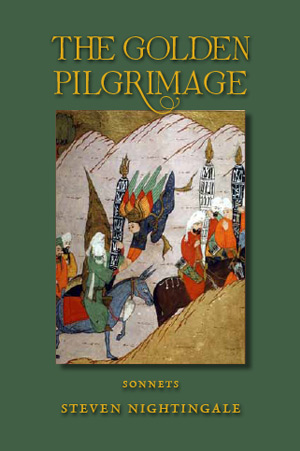
Order: |
Reviews“Reading Steven Nightingale’s sonnets is like sitting in the backyard on a warm waxing quarter moon summer night with a large glass of Vince Arroyo dark red zinfandel, a small fragrant nightwind soughing its way home through the cedar and live oaks, and a minor god’s ransom of jeweled fireflies dancing, calling the stars to pop out and come play, one by one.” “Golden Pilgrimage soars with lightness and song. The music coursing through this attractive book holds to an unbending certainty in the power of lyricism to render a world overflowing with splendor, ache, and awe. This book is a small astonishment.” |

IntroductionSome poems, stories, and novels of the present and of past centuries are infused with harmony and clarity, with orchestral energy; they hold such a beckoning and a consummation in beauty, that they remake our minds and manner of life. Our study of them builds around us a house where we can live, and frees the mind so that it may carry on with a fateful journey. We might call it our golden pilgrimage. Yet the principles and meaning of such work are called often into question by current opinion and culture, with its melancholy and suspicion. The idea that beauty calls us to clarity and life is mocked. A sense that the earth offers us with grace and gift-giving labors a power, a provenance, a destination—this is seen as fanciful. The notion of peace as a living reality, a quality of mind and work, is treated as sentiment—trivial when compared to the melodrama of conflict and grandeur of emotion. The soul, conceived as that part of the body which may be made permanent by love, is now scorned, or swollen and infected by religious pride. Neither the sonnet, as a form, nor this writer, as a man, can deny literary stakeholders or the historical moment. But to submit to such influence is another matter, bound up with conscience and experience. And as conscience is fierce and searching, so experience is delicious and determinative. With these resources we may resist a coarse commercial chant, the hymn of contempt in fundamentalist belief, the noisy glamour of violence in books and politics, and the booming invitations to waste and obedience that blow through our daily lives. We live in this pandemonium, but off to the side, nearby, without fanfare, in a quiet hour, even in the tempest of the news, you will hear if you seek to hear a trustworthy whisper, an amorous overture, a movement of wings, a small song: the sonetto, our sonnet. For more than eight hundred years this form has been used to sing to us of our chance to travel where peace flourishes, where beauty offers irresistible life, where the soul has at last a savor of home. A small song, yet in just the way love might have a small beginning—a bemused glance across a room, an unexpected grace note in conversation, a sudden embrace in the twilight. These sonnets now are yours. They are your companions. I write them because of your blessed travels toward life. If you find them familiar, there is a reason. You are the reason—the way you love, the world you make, the beauty you give. —S. N. |
|
